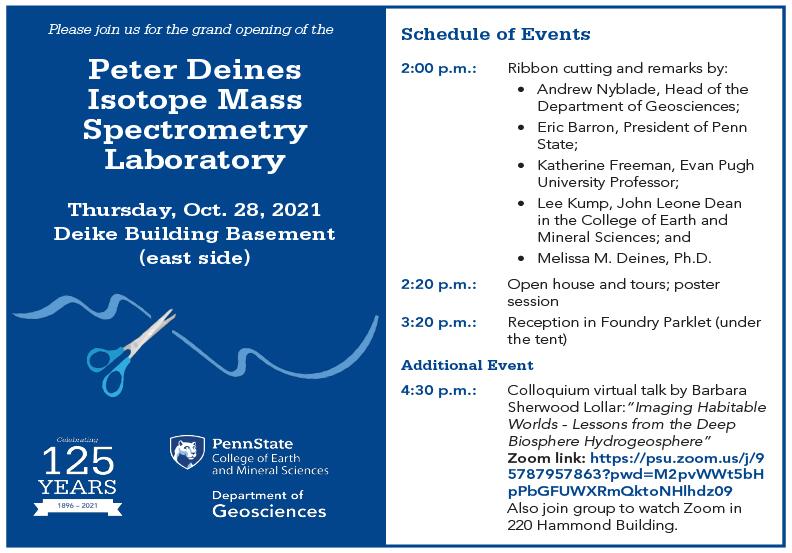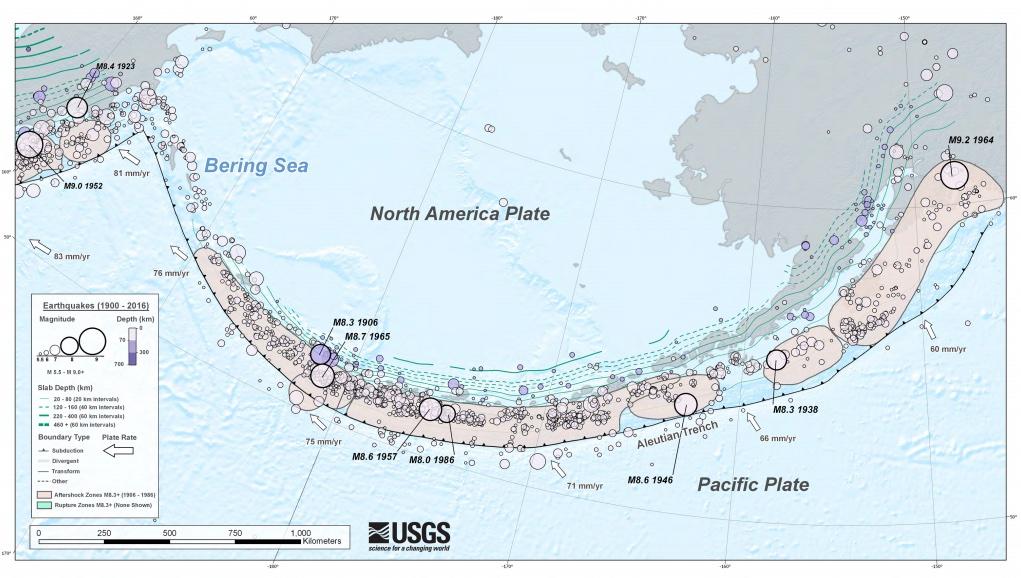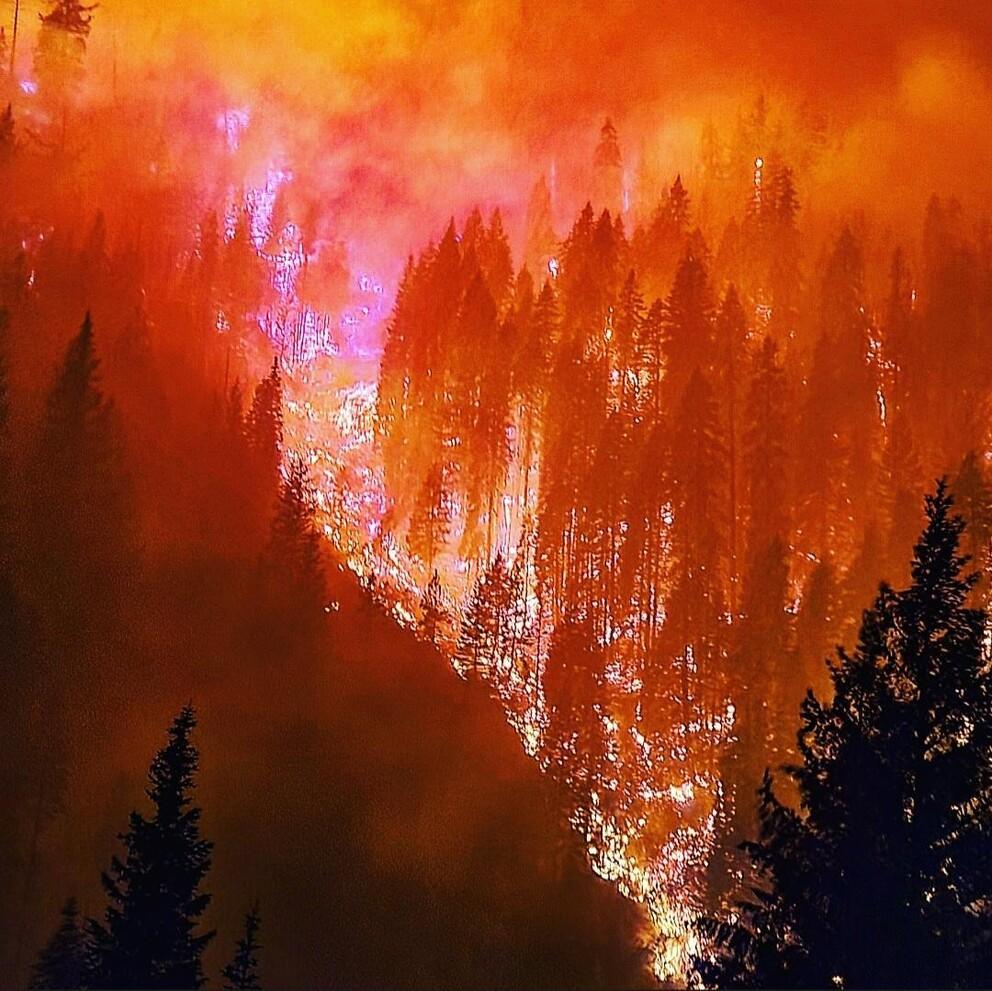Schedule of Events
Zoom Link: https://psu.zoom.us/s/94992382444
2:00pm Ribbon cutting and remarks by:
• Andrew Nyblade, Head of the Department of G eosciences;
• Eric Barron, President of Penn State;
• Katherine Freeman, Evan Pugh University Professor;
• Lee Kump, John Leone Dean in the College of Earth and Mineral Sciences; and
• Melissa M. Deines, Ph.D.
2:20pm Open house and tours; poster session
3:20pm Reception in Foundry Parklet (under the tent)
Additional Event
4:30pm CoIIoquium virtuaI talk by Barbara Sherwood Lollar: "Imaging Habitable Worlds - Lessons from the Deep Biosphere Hydrogeosphere" Zoom link: https://psu.zoom.us/j/95787957863?pwd=M2pvWWt5bH
pPbGFUWXRmQktoNHlhdz09 Also join group to watch Zoom in 220 Hammond Building.
A new endowed professorship in the Department of Geosciences in the College of Earth and Mineral Sciences honors the legacy of husband-and-wife Penn State researchers, one a distinguished professor emeritus in the department.
The flooding caused by Hurricane Ida across the Southeast and Mid-Atlantic regions provides a glimpse at the disasters threatening coastal communities as the climate warms. These disasters often disproportionately affect communities of color and other historically underserved neighborhoods. A $19.9 million grant from the National Science Foundation’s Coastlines and People Program (CoPe) will help to bring researchers and stakeholders together to equitably support coastal communities to better manage coastal climate risks.
Bradford Foley and Kimberly Lau, both assistant geosciences professors in Penn State’s College of Earth and Mineral Sciences, are part of the eight multidisciplinary teams of researchers selected to receive funding in the inaugural year of "Scialog: Signatures of Life in the Universe," a new research initiative designed to bring the world closer to answering basic questions about the possibility of extraterrestrial life.
Investigation of subsurface environments and subsurface processes is becoming more and more important in our understanding of planetary evolution, habitability and the search for life. Barbara Sherwood Lollar, University Professor in Earth Sciences and Dr. Norman Keevil Chair in Ore Deposits Geology at the University of Toronto, will discuss her research on this topic in the talk, "Imaging Habitable Worlds – Lessons from the Deep Biosphere and Hydrogeosphere."
By Davitia James, Temblor Earthquake News Extern (@davitiaa)
Citation: James, D., 2021, Fluids and tiny minerals play a big role in subduction zones, Temblor, http://doi.org/10.32858/temblor.213
The Earth’s surface is constantly moving as tectonic plates slide past, rip away from, and bump into each other. All this commotion commonly creates earthquakes at plate boundaries, but these seismic events are not evenly spaced, geographically speaking. Why do earthquakes happen more often along some parts of a plate boundary? And why do some places seem to escape large seismic events?
Melissa Lee will give the College of Earth and Mineral Sciences’ 2021 Lattman Visiting Scholar of Science and Society Lecture. Her talk, “Training the Next Generation Workforce for a Sustainable Future,” will be held at 5 p.m. on Monday, Oct. 18, in 26 Hosler Building on the University Park campus. The event is free and open to the public.
Traffic levels in North America plummeted in March 2020 as governments implemented stay-at-home measures to prevent the transmission of COVID-19. A two-year, $400,000 grant from the National Oceanic and Atmospheric Administration’s Climate Program Office will allow a Penn State-led research team to measure the rapid changes in greenhouse gas emissions that resulted from lower traffic levels and efforts to curb transmission of the virus.
Previous fires may hold the key to predicting and reducing the severity of future wildfires in the western United States as fire activity continues to increase, according to researchers from Penn State and the U.S. Forest Service.
Andrew Smye, assistant professor of geosciences at Penn State, will use a $640,000 Faculty Early Career Development Program grant from the National Science Foundation to shed light on a geological mystery while advancing educational opportunities for underrepresented students.











